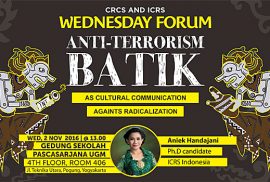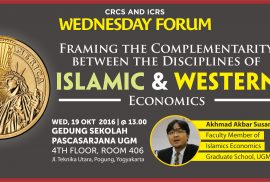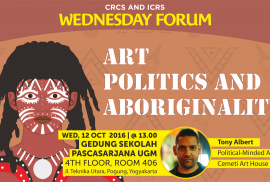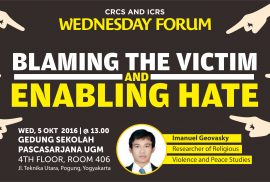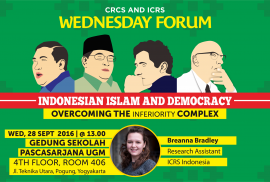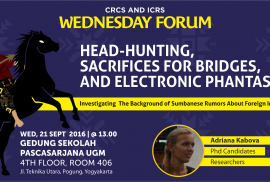
Abstract
Acknowledged by UNESCO in 2009 as a Masterpiece of Oral and Intangible Cultural Heritage of Humanity, batik is produced through an introspective creative process in which the artist uncovers a truth and presents local wisdom and beauty. In this way, it can be an effective means to communicate symbols, ideas and messages about peace, respect and interreligious tolerance in order to counter the growing radicalism in Indonesian society. Aniek Handajani will present her new book Batik Antiterorisme Sebagai Media Komunikasi Upaya Kontra – Radikalisasi Melalui Pendidikan dan Budaya (co-written with Eri Ratmanto and published by UGM Press, 2016) as well as several works of batik she has commissioned in order to encourage public discussion about terrorism and peace.
Speaker
Aniek Handajani is a staff at the East Java provincial office of the Ministry of Education and an English lecturer at the Faculty of Education, Islamic University, Lamongan. She earned her Masters in Education at Flinders University in Australia and is an educator and activist for inter-religious peace. Currently, she is a Ph.D. candidate at Inter-Religious Studies (ICRS), UGM, researching terrorism and deradicalization.
Wednesday Forum News

Abstract
The establishment of Islamic economics as an academic discipline has been motivated by a belief that the Islamic worldview differs from the worldview of Western capitalism. This premise seems to put Islamic economics in total opposition to conventional, or Western, economics. In the coming presentation, the speaker will argue that such an impression is wrong: although the Islamic worldview does differ from the worldview of Western capitalism, Islamic economics as an academic discipline was established to realize the Islamic worldview and can stand together with conventional economics established in the West Arguing that each can benefit from the other. The speaker will introduce a new framework for Islamic economic analysis that lays a foundation for the complementarity between Islamic and conventional or Western economics. This new framework can resolve the dilemma faced by Muslim economists and help to establish Islamic academic disciplines alongside their Western peers.
Speaker
Akhmad Akbar Susamto is a lecturer at the Departemen of Economics and a faculty member at the master program specialize in Islamic Economics, Graduate School, UGM. In additional to conventional [Western] Economics education background, he has a strong interest in Islamic Political Economy, Islamic Economics and Islamic Finance. He earns his bachelor, master’s and PhD degrees in Economics from UGM, Monash University and Australia Nasional University respectively.

Abstract
Tony Albert is a politically-minded artist provoked by stereotypical representations of Aboriginal people and the colonial history that attempts to define him, and what Aboriginality is, in the present. Interrogating contemporary legacies of colonialism that have impacted the lives of Aboriginal peoples in his homeland of Australia, he mines popular culture imagery and art historical source material while drawing upon personal and collective histories. His talk will explore Australian politics in relation to his own art practice. Examining the legacy of racial and cultural misrepresentation, particularly of Australia’s Aboriginal people, Albert has developed a universal language that seeks to rewrite historical mistruths and injustice.
Speaker
Tony Albert has spent the majority of his life in Brisbane, but has strong family connections further north to the Girramay and Kuku Yalanji people of the rainforest region of Australia. In 2004 he completed a degree in Visual Arts, majoring in Contemporary Australian Indigenous Art, at Griffith University. His work has been exhibited and collected by major institutions throughout Australia and he is currently artist-in- residence at Cemeti Art House, Yogyakarta.

Abstract
Who has the authority to end the discrimination and violence religious minority groups continue to face despite protections promised in Indonesia’s constitution? This talk examines three recent cases—the Ahmadiyya in West Java, Shi’a in East Java, and two HKBP churches also in West Java—to show how the three kinds of authority (legal-rational, traditional, and charismatic) identified by Max Weber are all used to legitimate extremism and violence in the face of contradictory actions by the government, including religious leaders with institutional authority inside it. Unless the actors in the government recognize that they must use their authority responsibly, extremist religious leaders who seek to mobilize hate against others, especially minorities, will continue to be able to do so and Indonesian society will remain immature.
Speaker
Imanuel Geovasky is graduated from School of Public Policy and Social Research International Christian University, Tokyo, Japan. He got Japan ICU Foundation Scholarship (JICUF) (New York based) and United Board for Higher Education in Asia (UBCHEA) (New York and Hongkong based) Faculty Development Scholarship for Master Degree in Peace Studies at International Christian University, Tokyo, Japan, from September 2013 – July 2015. His focus research on Religious-based violence and discrimation against minorities in Indonesia society, Human security and Peace building.

Abstract
Indonesian Islam connotes a pluralistic form of faith that is open and deeply engages local-specific cultures that concurrently emphasize a rigorous pursuit of social justice and equality for all. Despite the voluminous scholarship on Indonesian Islam, its correlation with Muhammadiyah’s “Islam Berkemajuan” and Nahdhatul Ulama’s “Islam Nusantara”—each having its own vision for a good society—remains woefully unexplained. This paper explores the interplay between Indonesian Islam and the praxis of democracy within the historical context of overcoming an apparent inferiority complex suffered by some segments of the Muslim community. The authors argue that as much as Indonesian Islam may have proven itself to be distinct from ‘the other Islams’, commonly found in its birthplace in the Middle East, there is still much to be desired for in terms of how to confidently overcome the historical baggage as a once colonized people. Using Said and Foucault’s analytical frameworks, the paper argues for a less humble attitude toward the propagation of Indonesian Islam to the outside world, given the protracted period of instability in the Middle East, ongoing terror attacks in different parts of the world and the politics surrounding Islamophobia.
Speaker
Breanna Bradley is an undergraduate student at Georgetown University’s Edmund A. Walsh School of Foreign Service located in Washington, District of Columbia, USA. Bradley’s studies focus on the relationship between culture and politics in Southeast Asia. She is currently a research assistant at the Indonesian Consortium for Religious Studies (ICRS), a Ph.D. program in Inter-Religious Studies located at Universitas Gadjah Mada, Yogyakarta, Indonesia. She has previously held positions as an undergraduate research fellow at Georgetown University’s Berkley Center for Religion, Peace and World Affairs and as a program coordinator for Georgetown University’s D.C. School’s Project, a program aimed to provide English language access for the immigrant community of the Washington DC area. She is interested in the role that Indonesian Islam plays in Indonesian culture and politics and is currently assisting with research surrounding the Tabot festival, a festival with its roots in Shia Islam celebrated by a majority Sunni community every year in Bengkulu, Sumatra.

Abstract
Rumors about head-hunting and construction sacrifices have been recorded in Southeast Asia since the beginning of 20th century. My focus is on the present-day form of these rumors on the island Sumba, Eastern Indonesia. First directed especially at the Dutch colonizers, stories about foreigners seeking for body parts have continually absorbed new features. In 1990’s, they focussed on new technologies that were imagined as electronic phantasms. Nowadays they target tourists and immigrants as well as people deviating from social norms. Following Jean-Nöel Kapferer, who defined rumors as one of the defense mechanisms by which members of communities try to preserve their old ways, I interpret Sumbanese rumors as a way for Sumbanese to define themselves in opposition to outside forces and as a tool for maintaining norms in society.
Speaker
Adriana Kábová earned her Master’s degree in Ethnology from the Charles University in Prague, Czech Republic. She is a PhD candidate in Anthropology, also at the Charles University in Prague, and is currently on an internship in the Pusat Studi Pariwisata at UGM. Her research interests include tourism and contemporary legends in Southeast Asia.

